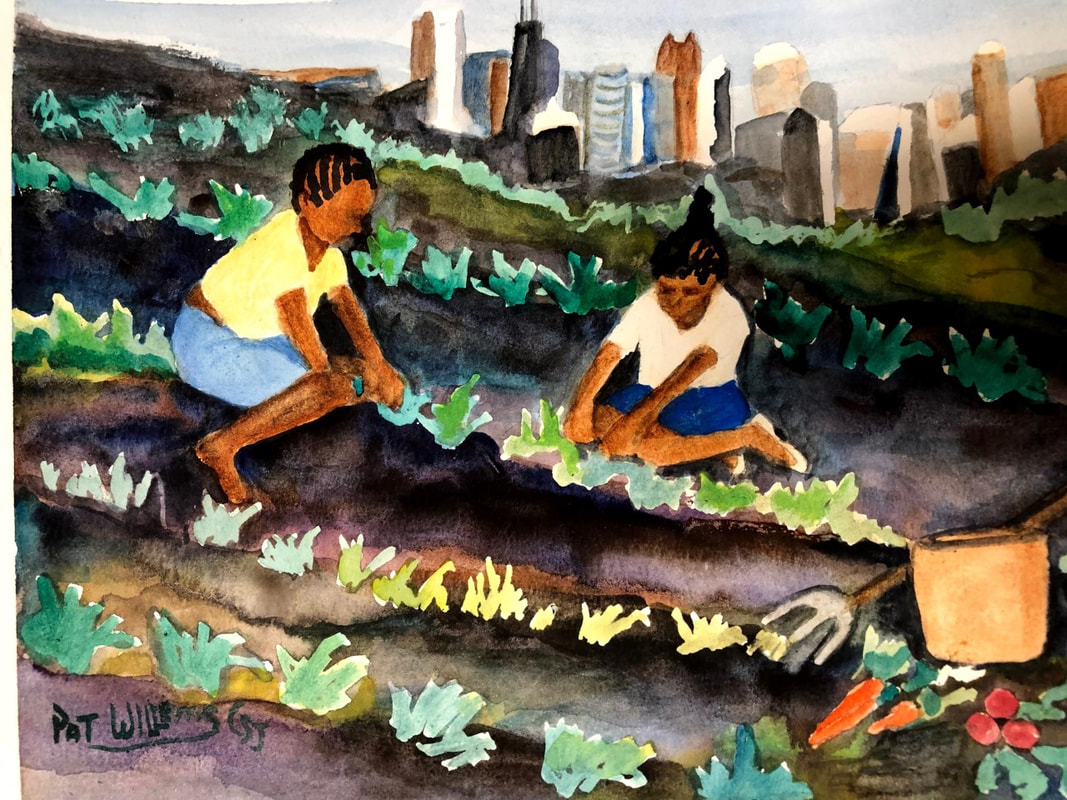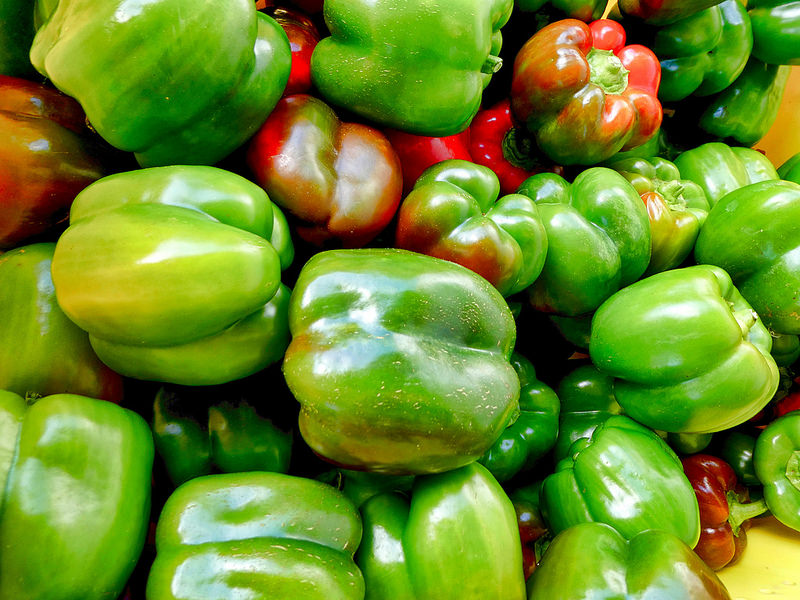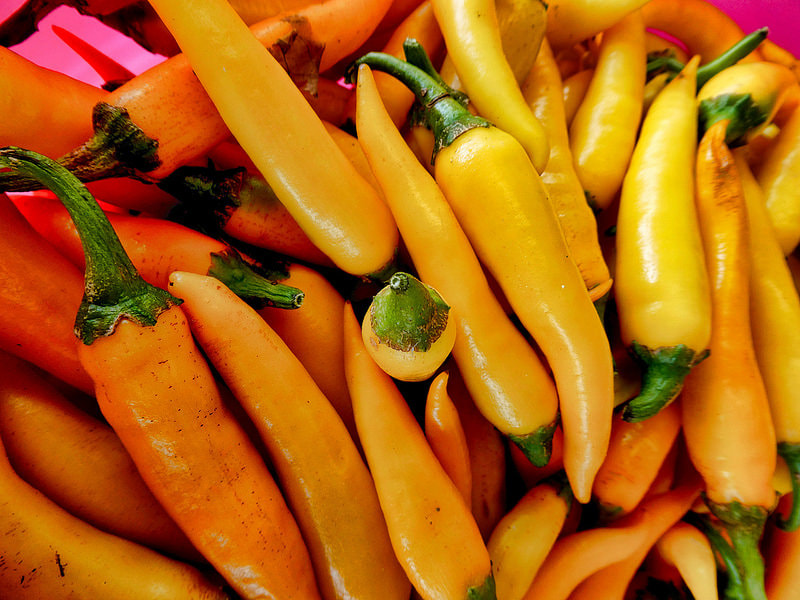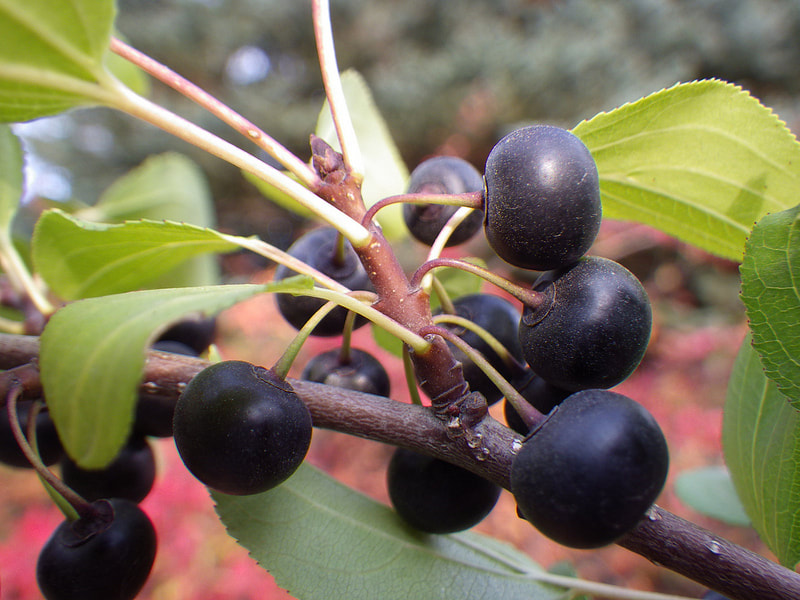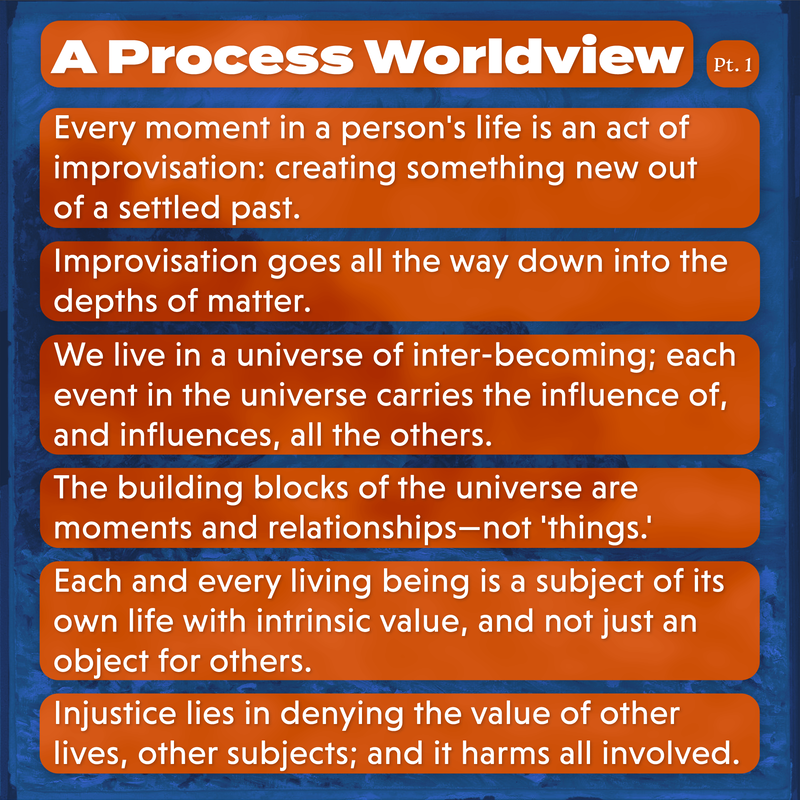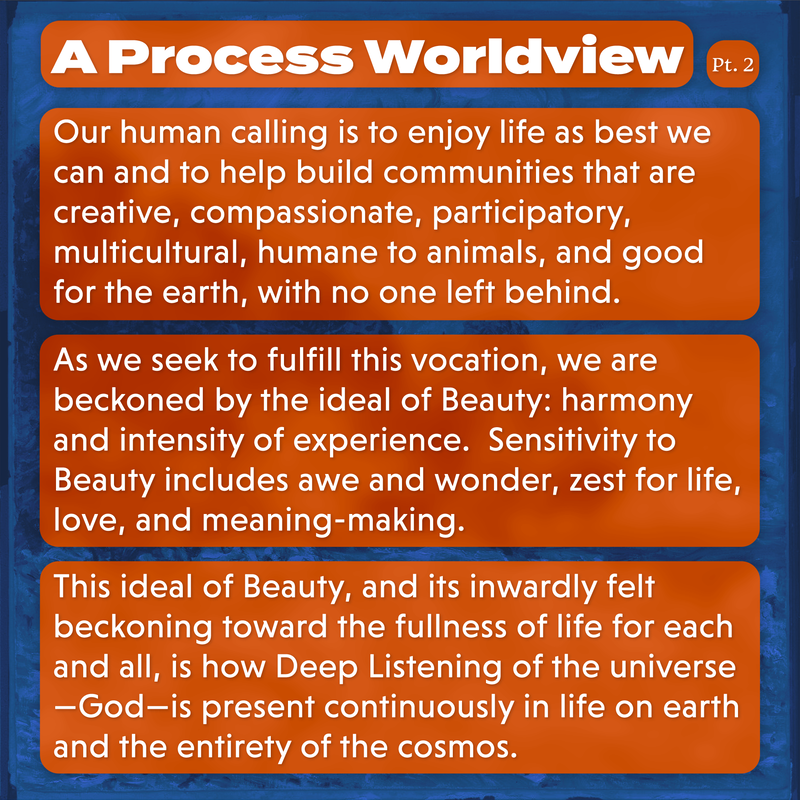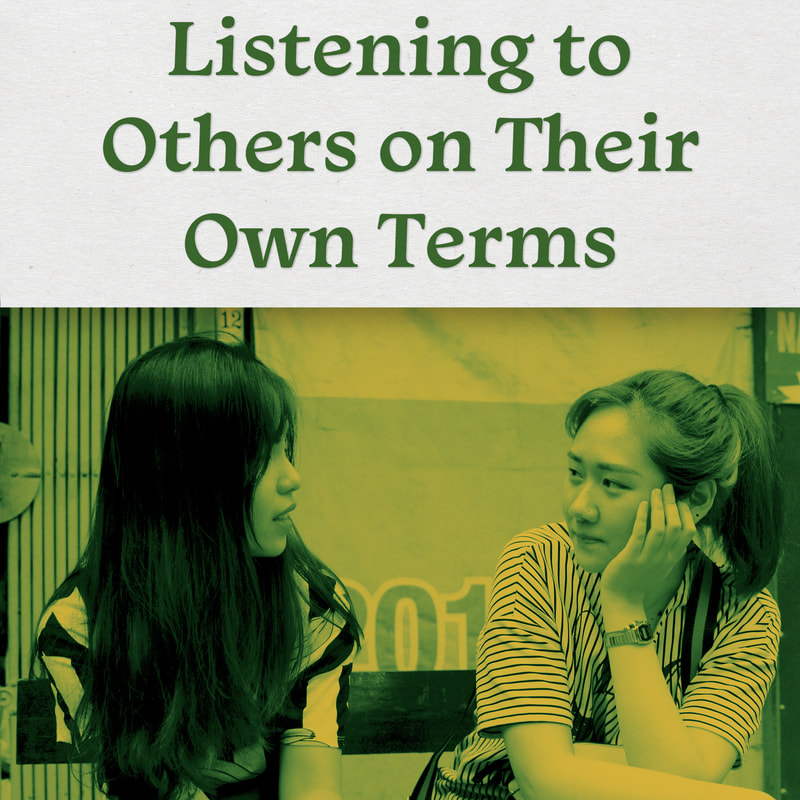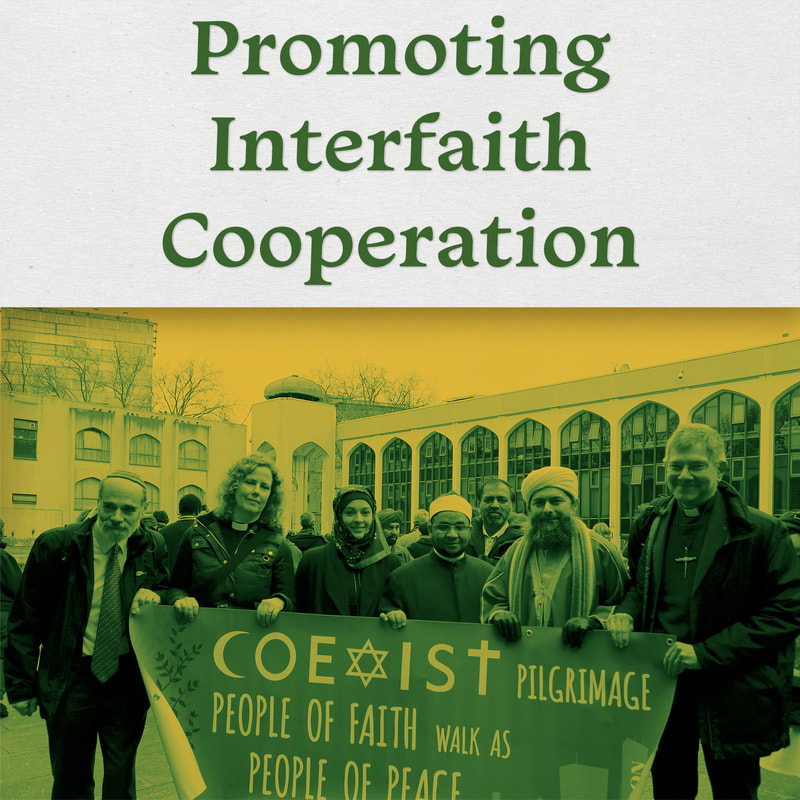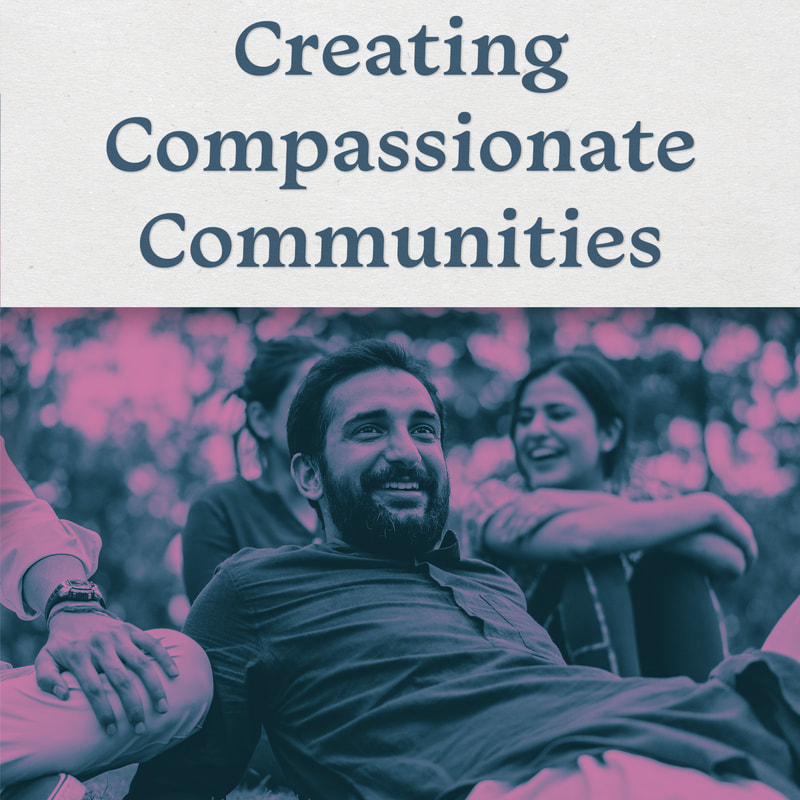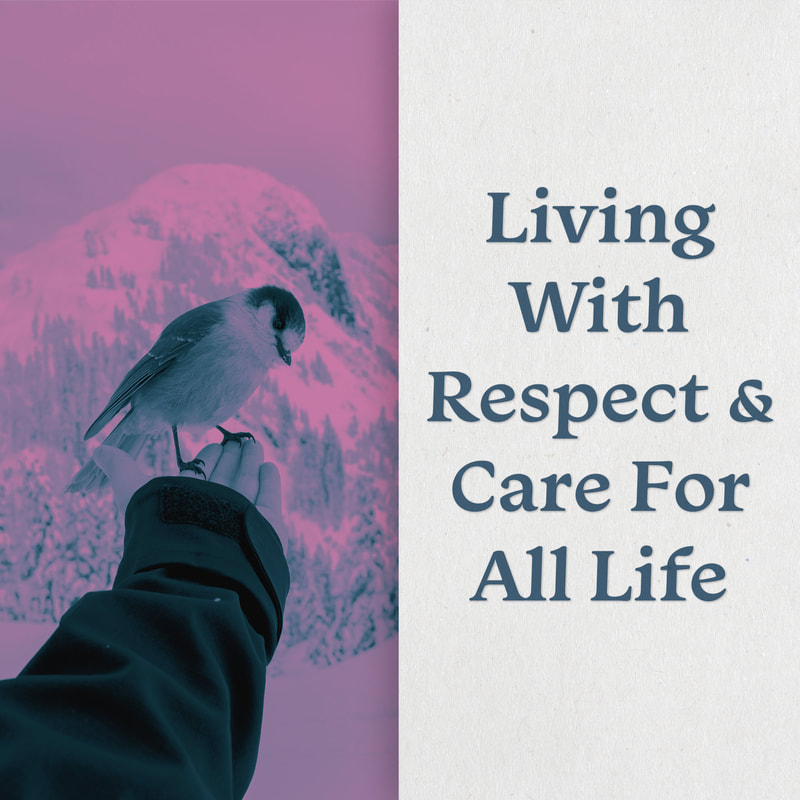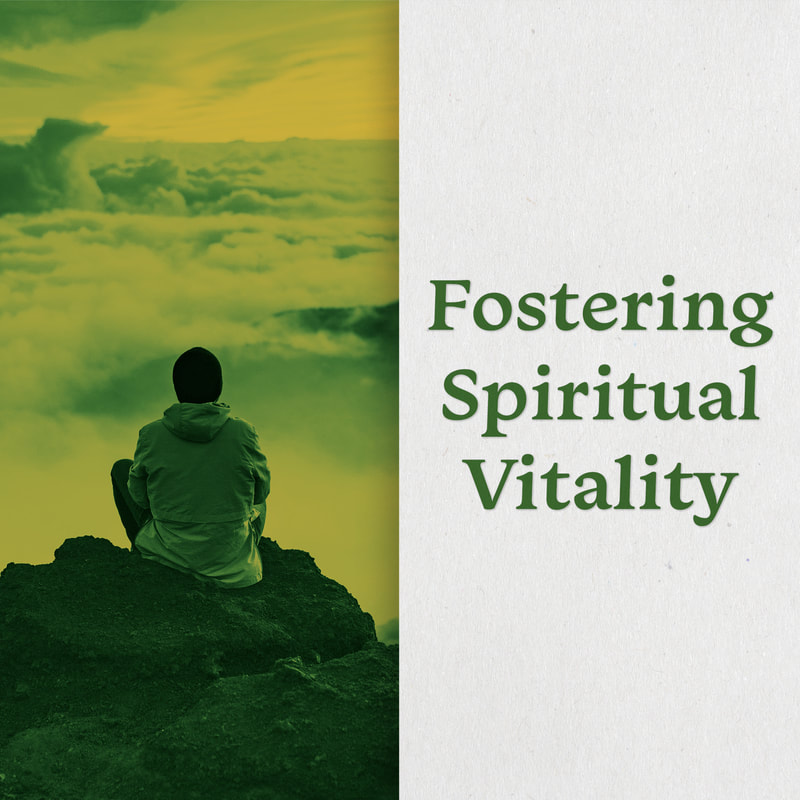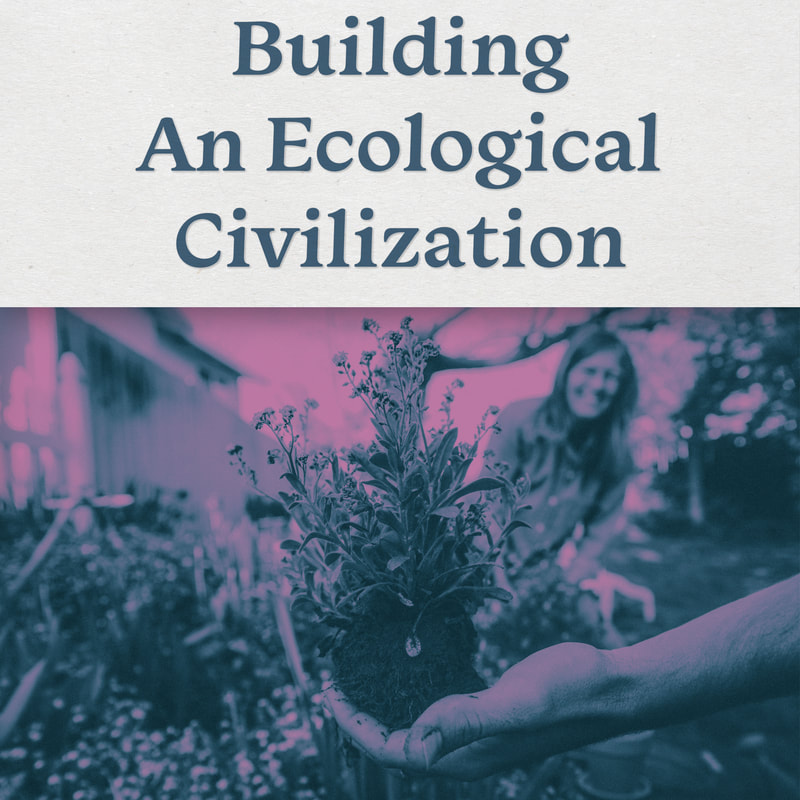- Home
- Process Worldview
- Community
- Art and Music
- Whitehead and Process Thinking
- Podcasts
- Spirituality
- Ecological Civilization
- Education
- Contact
- Social Justice
- Science
- Animals
- Sacred Poems
- Whitehead Videos
- Index of All Titles
- Practicing Process Thought
- Process Spirituality: A Spiritual Alphabet
- Recent Posts
Ecotheology as the World's Best Hope
“If someone has not learned to stop and admire something beautiful, we should not be surprised if he or she treats everything as an object to be used and abused without scruple. If we want to bring about deep change, we need to realize that certain mindsets really do influence our behaviour. Our efforts at education will be inadequate and ineffectual unless we strive to promote a new way of thinking about human beings, life, society and our relationship with nature. Otherwise, the paradigm of consumerism will continue to advance, with the help of the media and the highly effective workings of the market.”
― Pope Francis, Laudato Si: On care for our common home
Many people around the world seek an alternative to the narcissistic, consumer-driven, callous, and isolating ethos of urban-industrial civilizations. They want to live in local communities that are just, sustainable, and joyful, with no one left behind. They want to be friends with one another, friends with animals, and friends with the Earth. The alternative they seek is not just a philosophy; it is a mindset, an attitude. Pope Francis calls it Integral Ecology. John Cobb calls it Earthism. Others call it Ecological Civilization. On this page I call it Ecotheology. We search for names but the hope is the same.
- Jay McDaniel
What is Ecotheology
and how do you practice it?
Ecotheology is an outlook on life that sees something sacred
in people, animals, and the earth and in human efforts to
help build Ecological Civilizations, with no one left behind.
It is available to people with many different religious affiliations,
and also to people without any religious affiliation. It can include,
but does not require, belief in God. What is sacred is life itself.
An Ecological Civilization is a society in which people live with respect
and care for the community of life, with special care for the vulnerable,
They know that they are small but included in a larger web of life that includes
hills and rivers, trees and stars, and that this web is their extended family.
For them the universe is a communion of subjects and not just a collection of objects.
This means that there is something like aliveness -- or subjectivity -- everywhere.
The fundamental units of Ecological Civilizations are local communities,
in rural and urban settings, that are creative, compassionate, participatory,
egalitarian, culturally diverse, multi-religious, humane in their treatment of animals,
ecologically wise, playful, imaginative, and spiritually satisfying.
Below we at Open Horizons offer some general comment on ecotheology, and some
short-video examples of local action aimed at helping build Ecological Civilizations.
We hope this page will be useful to all who are interested
in helping build a greener, kinder, and more joyful world.
see also Jane Goodall's Prayer and John Cobb on David Korten
Jane Goodall and the
Ecotheological Spirit
Ecotheology: People and Ideas
Ecotheology. Ecotheology does not belong to a single culture or religion. It is a social and spiritual movement emerging in the 20th and 21st centuries among people of many different cultures, and from many walks of life, all over the world. They share the idea that the well-being of life on earth, not ever-increasing economic growth, is the best ideal for societies to follow; and that we humans become whole, not when we amass large amounts of material goods, but when we live kindly with one another, gently with animals, and lightly on the earth. Along with Gandhi, they believe that there is enough on earth to satisfy everyone's need, but not everyone's greed.
Some Mentors for Ecotheology: Lao Tzu, Black Elk, Gandhi, Tagore, Rachel Carson, Howard Thurman, John Muir, Thomas Berry, Jane Goodall, and Pope Francis.
Examples of Ecotheology. Pope Francis' Laudato Si. The building of a community garden. Earth jazz. Victor Wooten's organization of a Center for Music and Nature outside Nashville, Tennessee. Permaculture. Jane Goodall's video above.
A sample of Ecotheological Ideas. The environment is not an issue among issues but rather a context for all issues, because it is the web of life on earth. The universe is a communion of subjects, not a collection of objects; there is no 'dead' matter. God is not a tyrant in the sky but rather the deep Listening in whom the universe lives and moves and has its being. Our calling in life is not to ask how much we can get from life but rather what does the world need from us. It is to help build eco-communities.
Eco-communities. Neighborhoods, villages, towns, cities, states, and nations that are creative, compassionate, participatory, diverse, ecologically wise, and spiritually satisfying, with no one left behind. They can also be called just and sustainable communities.
The theological side of Ecotheology. Ecotheologians emphasize that there are three dimensions of a well-lived life: spirituality, understanding, and action. The theological side of ecotheology is its spirituality. It may or may not involve belief in God, understood as a personal presence active in the world or a deep listener affected by all that happens. It always involves respect and care for the community of life. a sense of being small but included in a larger whole, delight in multiplicity, and gratitude for beauty.
So non-theists can be Ecotheologians? Yes. The heart of Ecotheology is respect and care for the community of life. Belief in God is a viable way of embodying this respect but not the only way, but it is not necessary. People can appreciate the sacredness of felt connections with other people, animals, and the Earth without believing in God. Thy believe in the horizontal sacred.
What about people who believe in God? Can they be ecotheologians? Yes, of course. There are many ways of understanding God. Many ecotheologians (process theologians, for example) understand God panentheistically, which means everything-in-God. The general idea is that the universe is inside God, not unlike the way in which clouds are in the sky or an embryo is in a womb, but that God is also more than everything added together, continuously influential in the world as a non-coercive lure toward wisdom, compassion, and creativity in human life, a lure to live with satisfaction in other animals, and a lure toward novelty in the cosmos as a whole.
Can people who are "spiritual but not religious" be ecotheologians? Yes. Many ecotheologians are not affiliated with the world religions and identify themselves as naturalists. But many ecotheologians are religiously affiliated, too; and the world's religions offer many resources for a healthy ecotheology. If you are curious about how the world's religions can help people live lightly on the earth and gently with one another, see the Yale Forum on Religion and Ecology.
What about science? Many ecotheologians are also scientists, and almost all ecotheologians (scientists or otherwise) are grateful for, and indebted to, modern science. Some version of evolutionary thinking is presumed not questioned. Pope Francis and Jane Goodall are good examples. Ecotheologians oppose making a god of science (scientism) but not science itself.
Integral Ecology. Pope Francis' name for a state of affairs in which care for people, care for animals, and care for the earth is integrated. Integral ecology is a good name for what eco-communities embody and aspire to embody.
Eco-Justice. The human side of integral ecology. A state of affairs in which human beings freely participate in the decisions that affect their lives; with ample opportunities for life, liberty, education, health care, and happiness. They are free from fear and free to enjoy rich relations with other people and the more-than-human world.
Two Sides: The Political and the Personal. One of the aims of the ecotheologian is to empower people to build eco-communities. This is the political side of Ecotheology. Another is to provide them with opportunities for personal fulfillment and satisfaction. This is the personal side of Ecotheology. Often these two -- the political and personal -- go hand in hand. Both are important.
Language of Ecotheology. Ecotheology can speak through words, images, movements, and sounds. All can function as lures for feeling and understanding. Landscapes and soundscapes can also function as lures for feeling. Lures for feeling can be humanly made or they can be made by the more than human world: geological activity, for example. There is no need to impute conscious intention to the creation of the lures in either the human or more-than-human realm.
Beauty and Ecotheology. Beauty is harmony and intensity in objects perceived and, still more deeply, in the depth of relationships. It is at the heart of the spiritual side of Ecotheology. Beauty is felt in the natural world, in the poignancy of human relationships, and in music and the arts. It is what sustains the action and part of what informs the understanding.
Spiritual practices and Ecotheology. Spiritual practices are activities that help people plant or replant themselves in beauty. They can include prayer, meditation, gardening, running, and, as Victor Wooten makes clear, learning to play a musical instrument.
Cultural Obstacles to Ecotheology. Consumerism, anthropocentrism, patriarchy, hyper-individualism, dualisms that draw sharp distinctions between humanity and the web of life, and mechanistic worldviews that reduce the whole of reality to a machine for human use.
Social Context of Ecotheology Today. Global climate change, social injustices, war and threat of nuclear war, economic inequality, political repression, and cultural despair; and the existential need on the part of human beings to enjoy rich connections with the more-than-human world, as intensified by urbanization and alienation from the world.
Eco-spirituality. Respect and care for the community of life, a sense of being small but included in a larger whole, sensitivity to individual human beings and other animals as subjects of their own lives (not simply objects for others), delight in multiplicity, and gratitude for beauty.
Some Mentors for Ecotheology: Lao Tzu, Black Elk, Gandhi, Tagore, Rachel Carson, Howard Thurman, John Muir, Thomas Berry, Jane Goodall, and Pope Francis.
Examples of Ecotheology. Pope Francis' Laudato Si. The building of a community garden. Earth jazz. Victor Wooten's organization of a Center for Music and Nature outside Nashville, Tennessee. Permaculture. Jane Goodall's video above.
A sample of Ecotheological Ideas. The environment is not an issue among issues but rather a context for all issues, because it is the web of life on earth. The universe is a communion of subjects, not a collection of objects; there is no 'dead' matter. God is not a tyrant in the sky but rather the deep Listening in whom the universe lives and moves and has its being. Our calling in life is not to ask how much we can get from life but rather what does the world need from us. It is to help build eco-communities.
Eco-communities. Neighborhoods, villages, towns, cities, states, and nations that are creative, compassionate, participatory, diverse, ecologically wise, and spiritually satisfying, with no one left behind. They can also be called just and sustainable communities.
The theological side of Ecotheology. Ecotheologians emphasize that there are three dimensions of a well-lived life: spirituality, understanding, and action. The theological side of ecotheology is its spirituality. It may or may not involve belief in God, understood as a personal presence active in the world or a deep listener affected by all that happens. It always involves respect and care for the community of life. a sense of being small but included in a larger whole, delight in multiplicity, and gratitude for beauty.
So non-theists can be Ecotheologians? Yes. The heart of Ecotheology is respect and care for the community of life. Belief in God is a viable way of embodying this respect but not the only way, but it is not necessary. People can appreciate the sacredness of felt connections with other people, animals, and the Earth without believing in God. Thy believe in the horizontal sacred.
What about people who believe in God? Can they be ecotheologians? Yes, of course. There are many ways of understanding God. Many ecotheologians (process theologians, for example) understand God panentheistically, which means everything-in-God. The general idea is that the universe is inside God, not unlike the way in which clouds are in the sky or an embryo is in a womb, but that God is also more than everything added together, continuously influential in the world as a non-coercive lure toward wisdom, compassion, and creativity in human life, a lure to live with satisfaction in other animals, and a lure toward novelty in the cosmos as a whole.
Can people who are "spiritual but not religious" be ecotheologians? Yes. Many ecotheologians are not affiliated with the world religions and identify themselves as naturalists. But many ecotheologians are religiously affiliated, too; and the world's religions offer many resources for a healthy ecotheology. If you are curious about how the world's religions can help people live lightly on the earth and gently with one another, see the Yale Forum on Religion and Ecology.
What about science? Many ecotheologians are also scientists, and almost all ecotheologians (scientists or otherwise) are grateful for, and indebted to, modern science. Some version of evolutionary thinking is presumed not questioned. Pope Francis and Jane Goodall are good examples. Ecotheologians oppose making a god of science (scientism) but not science itself.
Integral Ecology. Pope Francis' name for a state of affairs in which care for people, care for animals, and care for the earth is integrated. Integral ecology is a good name for what eco-communities embody and aspire to embody.
Eco-Justice. The human side of integral ecology. A state of affairs in which human beings freely participate in the decisions that affect their lives; with ample opportunities for life, liberty, education, health care, and happiness. They are free from fear and free to enjoy rich relations with other people and the more-than-human world.
Two Sides: The Political and the Personal. One of the aims of the ecotheologian is to empower people to build eco-communities. This is the political side of Ecotheology. Another is to provide them with opportunities for personal fulfillment and satisfaction. This is the personal side of Ecotheology. Often these two -- the political and personal -- go hand in hand. Both are important.
Language of Ecotheology. Ecotheology can speak through words, images, movements, and sounds. All can function as lures for feeling and understanding. Landscapes and soundscapes can also function as lures for feeling. Lures for feeling can be humanly made or they can be made by the more than human world: geological activity, for example. There is no need to impute conscious intention to the creation of the lures in either the human or more-than-human realm.
Beauty and Ecotheology. Beauty is harmony and intensity in objects perceived and, still more deeply, in the depth of relationships. It is at the heart of the spiritual side of Ecotheology. Beauty is felt in the natural world, in the poignancy of human relationships, and in music and the arts. It is what sustains the action and part of what informs the understanding.
Spiritual practices and Ecotheology. Spiritual practices are activities that help people plant or replant themselves in beauty. They can include prayer, meditation, gardening, running, and, as Victor Wooten makes clear, learning to play a musical instrument.
Cultural Obstacles to Ecotheology. Consumerism, anthropocentrism, patriarchy, hyper-individualism, dualisms that draw sharp distinctions between humanity and the web of life, and mechanistic worldviews that reduce the whole of reality to a machine for human use.
Social Context of Ecotheology Today. Global climate change, social injustices, war and threat of nuclear war, economic inequality, political repression, and cultural despair; and the existential need on the part of human beings to enjoy rich connections with the more-than-human world, as intensified by urbanization and alienation from the world.
Eco-spirituality. Respect and care for the community of life, a sense of being small but included in a larger whole, sensitivity to individual human beings and other animals as subjects of their own lives (not simply objects for others), delight in multiplicity, and gratitude for beauty.
Creative Localization
Practicing Ecotheology
in Local Settings
|
|
|
|
|
